#Marmara University
Explore tagged Tumblr posts
Text
Museum & Art Gallery of Marmara University in Istanbul, Turkey.

The building was designed by a French and an Italian Architect.
#Museum#Art#Gallery#Tree#Cloudy Sky#Street Scene#Marmara University#Sultanahmet Square#Istanbul#Turkey
54 notes
·
View notes
Text






🤍✨🤍✨
#ay benim gece senin#marmaraüniversitesi#university#marmara#beyza alkoç#3391kilometre#karantina#gelmemeyegidenadam#spotify#kar tanesi#aestethic#duman#egeninizmiri
36 notes
·
View notes
Text


Mysterious 1,800-year-old Roman gladiator tomb discovered in Turkey
A significant archaeological discovery has been made at Ayasuluk Hill and the St. John Monument in Selcuk, Izmir. Researchers have unearthed a tomb believed to belong to a Roman gladiator from the third century B.C. This tomb later reused in the fifth century A.D., contained the remains of 12 individuals.
The excavation, authorized by the Ministry of Culture and Tourism with support from various institutions, is led by associate professor Sinan Mimaroglu from Hatay Mustafa Kemal University’s Department of Art History.
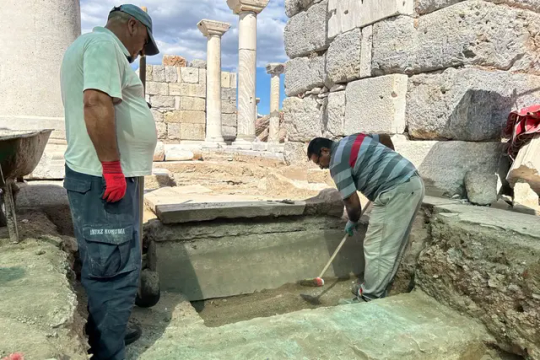
Who is Roman gladiator?
The team recently discovered a Roman tomb featuring twelve skeletons. The tomb, studied by associate professor Ertan Yildiz, has been identified as belonging to a Roman gladiator named “Euphrates.” It features epigraphic inscriptions and three cross reliefs added during its later use in the fifth century.
This tomb is believed to date back to the third century B.C. and is similar to imperial tombs found in Istanbul, Marmara Island, and Syria.

Surprising discoveries beneath the surface
Mimaroglu expressed astonishment at finding a water channel, a drainage system, mosaics, and several tombs just 20 centimeters below the surface.
“We found one tomb and three tomb-like structures, with 12 individuals inside. This indicates a collective burial,” he stated. He emphasized the importance of this Roman tomb, which has exquisite epigraphic inscriptions and Christian symbols added during its later use.

Insights into church and its burials
Mimaroglu provided information about the church associated with the tomb. Initially a small burial structure, it was later converted into a wooden-roofed basilica and eventually into a domed church during the reign of Emperor Iustinian I.
He noted, “The burials inside the church likely belong to the upper class or clergy, as it’s unlikely an ordinary person would be buried in such a meticulous manner within a church.”
Initial findings suggest the crosses inside the tomb were carved in the fifth century, while the crosses on the tomb’s lid might have been added in the seventh and eighth centuries. Archaeological evidence supports that the mosaic beneath was also altered after the time of Iustinian I.

Comparisons to similar finds
Regarding the cross reliefs within the tomb, Mimaroglu remarked that similar examples are found in imperial tombs in Istanbul, but this tomb was constructed with higher-quality materials.
He noted that similar tombs have been discovered in Marmara Island and Syria, though the cross designs differ. The team continues to search for comparable examples for publication.

Evidence of early Ephesus
Mimaroglu mentioned the site’s significance, stating it contains evidence of early Ephesus dating back to the second millennium B.C., with ceramics from the Early, Middle, and Late Bronze Ages.
Excavations began in the church of St. John in 1921-1922 under Greek archaeologist Soteriou and have continued under his direction since 2020.

New discoveries from georadar studies
In 2023, georadar studies were conducted in the area, confirming findings from previous excavations by Hormann. Mimaroglu explained, “These excavations revealed a marble floor, dating back to the 6th century, consistent with the period of Iustinian I. This year’s discoveries affirm the presence of a marble flooring from the 5th century.”
The discovery of this ancient Roman gladiator’s tomb not only sheds light on the burial practices of the time but also enriches our understanding of early Ephesus and its historical significance.
By Koray Erdogan.

#Mysterious 1800-year-old Roman gladiator tomb discovered in Turkey#Ayasuluk Hill and the St. John Monument#Selcuk Izmir#Roman gladiator named Euphrates#Roman gladiator’s tomb#ancient tomb#ancient grave#ancient artifacts#archeology#archeolgst#history#history news#ancient history#ancient culture#ancient civilizations#roman history#roman empire#ancient roman sarcophagus
60 notes
·
View notes
Text
by David Litman
The arrest, detention, and pending deportation of Badar Khan Suri, an “academic” at Georgetown University, illuminate a disturbing reality about modern society. No, not about U.S. immigration policy. Rather, the situation is exposing the mainstream media’s extraordinary failure to perform basic journalism.
Consider the narrative consistently advanced in major western media outlets.
“Having a view of the ongoing conflict is not a crime,” reads one quote at the BBC. “[H]e is being punished because of the suspected views of his wife,” reads another from Politico. “[T]o his defenders, Khan Suri is an accomplished scholar whose research focuses on peacebuilding,” writes CNN. “Suri was detained because of his wife’s Palestinian heritage and the couple’s political beliefs about U.S.-Israel policy,” his lawyer claims in a Washington Post article. His arrest is part of “efforts to expel foreign nationals who participated in pro-Palestinian demonstrations,” asserts The Guardian.
The gist? Khan Suri and his wife are being unfairly targeted merely for pro-Palestinian speech.
The problem? Just a few minutes of basic research uncover facts that upend the entire narrative. Yet not one of these major outlets, nor the dozens more covering the story, bothered.
In 2010, Khan Suri’s wife, Mapheze Saleh, was a part of Hamas’s Committee to Break the Siege in Gaza. Yes – Mapheze was herself a member of the internationally designated terrorist organization, providing them with her services, a fact of which she makes no secret in Arabic media outlets. Notably, the committee happened to be chaired by her father, Ahmed Yousef, a senior official in Hamas’s “foreign ministry” and adviser to Hamas’s leader, Ismail Haniyeh.
Mapheze’s role involved at least two tasks. First, she welcomed organized groups of “solidarity convoys” to the Gaza Strip. Second, she was tasked with maintaining communication with members of those convoys so as to continue feeding them Hamas propaganda.
This is how she came to first meet Badar Khan Suri, her future husband.
For context, in January 2009 Israel instituted a naval blockade on the Gaza Strip. The move, made during the first major Israel-Hamas war, came in response to the launching from Gaza of some 5,000 rockets at Israeli communities. By then, Hamas – which had violently taken over the territory in 2007 – had already been amassing an arsenal of weapons smuggled in by actors such as Iran.
With its ability to smuggle in weapons drastically curtailed, Hamas viewed the blockade as an existential threat. Hamas and its supporters thus began organizing “convoys” and “flotillas” to “break the siege.” It was this effort in which Saleh and her father, Yousef, played an important role.
In the following months, numerous ships carrying weapons attempted to break the blockade but were turned back. The most infamous attempt, which involved a flotilla that included the Mavi Marmara in May 2010, resulted in deadly violence when Israeli forces boarded to halt the vessel.
So close were IHH and Hamas that Kaya’s son, Matin, was married to Ahmed Yousef’s other daughter, Mapheze’s sister.
The convoy had been organized by Insan Hak ve Hurriyetleri Vakfi (IHH), a Turkish Islamist organization. In 2008, IHH had been designated by Israel as a terrorist organization due to its provision of material, financial, and propaganda support for Hamas. It is also a part of the Union of the Good, which is designated by the United States as “an organization created by Hamas leadership to transfer funds to the terrorist organization.” In addition to Israeli authorities, even a United Nations panel of inquiry charged with investigating the Mavi Marmara incident expressed doubts about the “true nature and objectives of the flotilla organizers, particularly IHH,” which claimed to be a “humanitarian” organization.
IHH and Hamas’s collaboration in such efforts was well known. IHH had even established an office in Gaza, headed by a man named Muhammad Kaya, who held meetings with senior Hamas officials about providing aid to the terrorist organization and continuing to send flotillas and convoys. So close were IHH and Hamas that Kaya’s son, Matin, was married to Ahmed Yousef’s other daughter, Mapheze’s sister.
After the Mavi Marmara incident, Hamas and IHH didn’t let up, and both publicly promised to continue organizing convoys and flotillas to break the blockade preventing weapons from entering Gaza.
Among those subsequently organized by IHH was the “Asia 1 Convoy” which departed in late 2010. In addition to members of IHH, Khan Suri was among the participants. His convoy began its trek with a stop in Iran, where they met with Iranian regime officials, including Ayatollah Javadi Amoli and Ayatollah Makarem Shirazi. The convoy continued to Syria, where they were welcomed by Hamas leader abroad Khaled Mashaal, who told them, according to MEMRI: “the [only] option for liberating Palestine is resistance and jihad,” and that “Today, we will break the siege on Gaza, and tomorrow, with your help, we will liberate Palestine.”

Senior Hamas leader Khaled Mashaal speaking to the Asia 1 Convoy. Photo uncovered by MEMRI.
The convoy would also stop in Lebanon, Turkey, and Egypt before making its way into Gaza. This is when Khan Suri met Saleh. But Saleh wasn’t the only Hamas official Khan Suri met.
Publicly available images of the convoy in Gaza show Khan Suri engaging in a celebratory pose with Hamas leader Ismail Haniyeh. Also present at some of the welcoming events for the Asia 1 Convoy were other senior terrorists, including Ahmed Yousef (Saleh’s father), Mohammed al-Hindi, the deputy secretary-general of Islamic Jihad, and Mahmoud Al-Zahar, a senior Hamas political bureau member.

Khan Suri (right) in a celebratory pose with Hamas’s then “prime minister” Ismail Haniyeh (left)
Images posted by local journalists show convoy participants holding images of Ayatollah Khomeini (the former supreme leader of Iran) and Ismail Haniyeh, wearing Hamas headbands, waving the flag of the Iranian regime, and holding posters of “martyrs” (i.e., terrorists). Convoy leaders were quoted by the press as praising the “resistance” and referring to Israel as “the usurping state.” Haniyeh himself praised the convoy as a means to undermine Israel’s blockade. Al-Hindi, the Islamic Jihad official, stressed “the path of jihad” and “resistance” to the visitors. Zahar instructed the convoy members to “Continue to send convoys until the oppressive siege is lifted.”
This was not, as the BBC claimed, a trip that simply “brought [Khan] Suri closer to the Palestinian cause,” but a mission organized by one terrorist organization (IHH) to aid another terrorist organization (Hamas).
27 notes
·
View notes
Text
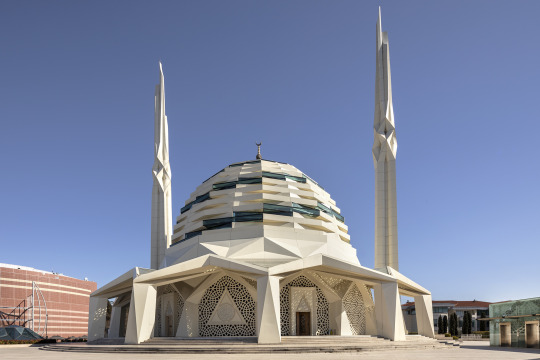
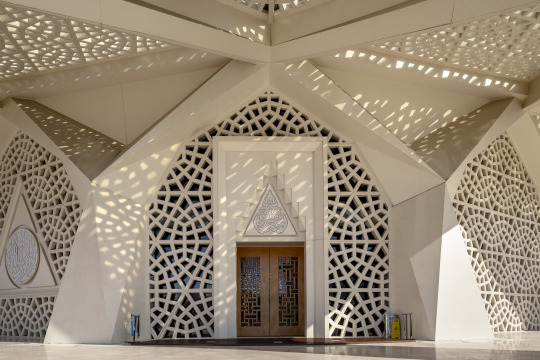
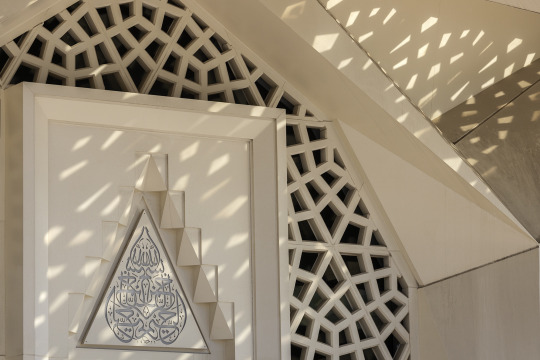
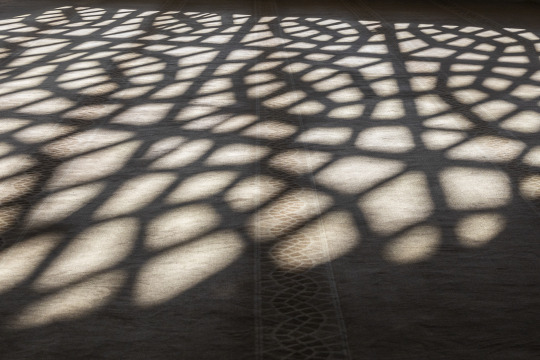
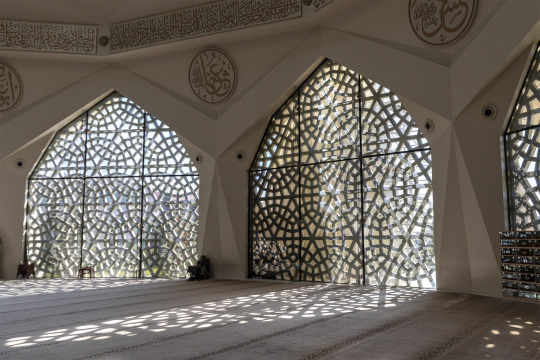
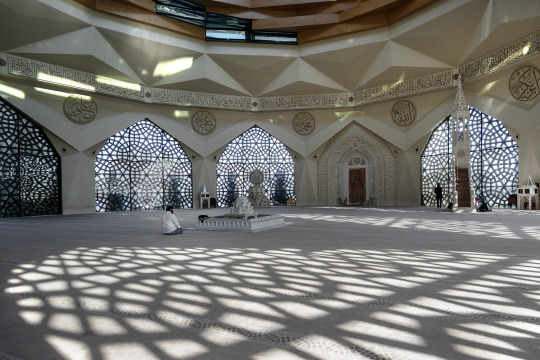
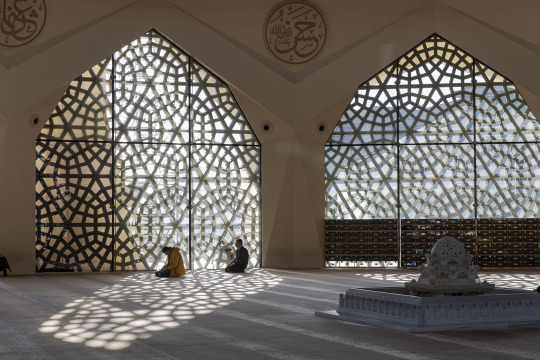
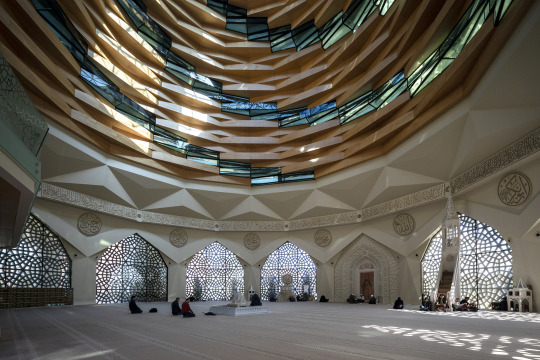
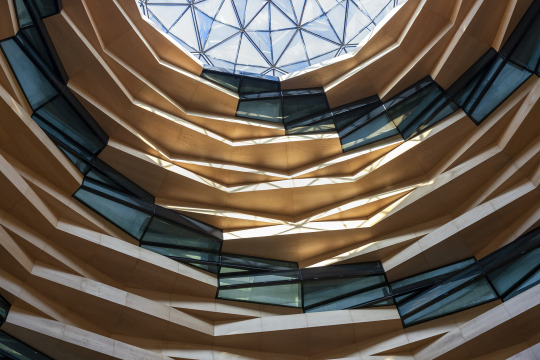
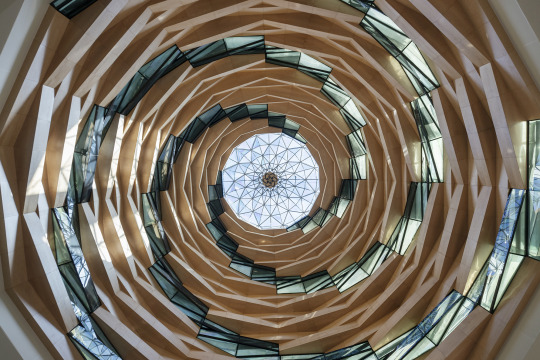
Marmara University Faculty of Theology Mosque, by Muharrem Hilmi Şenalp (2015).
Istanbul, Turkey.
© Roberto Conte (2023)
25 notes
·
View notes
Text
Hi folks!

I am Pelin and this is my page👋🏻. I would like to introduce myself briefly. I’m from Turkey and this year is my second year as a student at Marmara University English Language Teaching. I enjoy listening to music🎧, drawing🎨 and especially traveling✈️. I also like to acquire new hobbies and experience different things. I have never blogged on any medium before. So I would love for you to be my companion on this exciting journey🥰🐣💞

2 notes
·
View notes
Text
ISTANBUL (JTA) — “Jews not allowed,” read the sign in English and Turkish above Rağman Şahaf, a used book store next to Istanbul University and not far from the city’s famed Grand Bazaar.
Even after the sign was taken down on Friday, the store’s owner said he stuck by the message.
“I do not want to buy anything from Jews right now, I do not want to sell anything to Jews right now, this is how I tell them,” Ozkan Mustafa Küçükkural told the Jewish Telegraphic Agency.
“Maybe it should have said Zionist or Israeli, but I was angry and emotional,” he added. “My brothers in Palestine are dying.”
Anti-Israel banners and graffiti, along with Palestinian flags, have become commonplace across Istanbul, as many of its citizens fume over Israel’s response to the Hamas attacks on Oct. 7 that left over 1,400 dead. Images have also circulated of taxis with signs saying that their drivers would not serve Israelis.
Antisemitic incidents have taken place beyond Istanbul, too. In Izmir — a city once home to tens of thousands of Jews now in the midst of a small-scale Jewish revival — a synagogue was defaced with graffiti that read “Murderer Israel” on Saturday.
Turkish President Recep Tayyip Erdoğan, who has had an up and down relationship with Israel over the course of his 20 years as Turkey’s head of state, has come out firmly defending Hamas’ actions on Oct. 7, calling the terrorist group a “a liberation group.” In response, Israel recalled its diplomats from Turkey on Saturday.
It has all amounted to a tense atmosphere for Turkish Jews, who now number around 15,000 and descend mainly from Sephardic families but also include Ashkenazi, Romaniote and Mizrahi communities. That number was close to 80,000 in the founding year of Turkey’s republic in 1923 — exactly 100 years ago on Sunday.
Antisemitic rhetoric has spread throughout Turkish politics, too. A day after a hospital in Gaza was hit by rocket fire on Oct. 17, a politician from Turkey’s ruling AKP party, Süleyman Sezen, representing a small municipality called Atakum in the Black Sea city of Samsun, said at a public hearing that he was praying for the soul of Hitler, adding that the world will find peace when it is cleansed of Jews and that the Holocaust was “unfinished.” Evidence showing that the explosion was likely from a Palestinian Islamic Jihad rocket has not nullified such outbursts.
“The Hitler rhetoric is not new in Turkey,” said Turkish-Jewish publisher and author Rifat N. Bali, who has written about political Islam’s portrayal of Jews. “I cannot say that it comes from ultranationalist political fractions… Why? Because they are fed day in, day out, pictures of ‘babies killed by IDF.’”
On Oct. 10, Huda-Par parliamentarian Şahzade Demir addressed the Turkish parliament, calling to revoke citizenship for Turkish Jews if they volunteer for the Israeli military. Days later, Yeni Akit, a far-right media outlet, called for Turkish Jews to be denaturalized, under the false claim that they all have dual Israeli citizenship. (The Hrant Dink Foundation, a Turkish NGO devoted to minority issues in the country and named after a murdered Armenian-Turkish Journalist, has called out Yeni Akit as among the most prolific publishers of hate speech in Turkish media.)
“This fear scenario is not new. It was also brought up during the Mavi Marmara controversy, and the issue of citizenship of Jews who are citizens of the Republic of Turkey and who served in the Israeli army was brought to the agenda,” said Serdar Korucu, who writes a column on antisemitism in Turkey for the Jewish site Avlaremoz. He was referencing a deadly clash between the Israeli army and a flotilla of pro-Palestinian activists from Turkey in 2010. “There has never been such a practice in the history of the Republic of Turkey. The harshest sanction would be to prevent them from doing military service in the future.”
Several large pro-Palestinian protests have taken place in Istanbul since Oct. 7. In one demonstration, Turkish protesters briefly breached the fence of the Israeli consulate before being dispersed by Turkish police.
Erdogan, who had warmed to Israel in recent years, has regularly met with leaders of Hamas, which is considered a terrorist organization by the United States, the European Union and most Western powers. His foreign ministry said in a statement on Sunday that it rejects the idea that its rhetoric on Israel has been antisemitic.
“We reject the baseless accusations of anti-Semitism, and the slander and insults against our President and our country,” read the statement released on Sunday. “It is known to everyone that Türkiye’s track record on this issue is spotless — unlike many countries that support Israel unconditionally today.
“It is a truth acknowledged by all historians that Türkiye has been a safe haven for all those who were oppressed throughout history, including the Jews,” it added.
In 1492, the Ottoman Sultan, Bayezid II, sent ships to Spain to ferry exiled Spanish Jews to his empire, resulting in the country’s large Sephardic community of today. But Turkish Jews have also faced several periods of oppression, including an infamous tax in the 1940s and pogrom in the 1950s which have become the subject of a popular Turkish Netlfix series.
The local Jewish response to the situation has not been all shock and dismay. Jacob Behar, a Turkish Jew who owns a shop around the corner from the Istanbul shop that had the “Jews not allowed” sign, expressed disappointment at the sign but said it didn’t make him feel insecure.
“It doesn’t represent the general ideals of Turkish society,” he told JTA. “My family has been here over 500 years, we wouldn’t still be here if we didn’t feel safe. Of course, there are individual things, but there are also individual things in Israel.”
17 notes
·
View notes
Text
[N]ear the Küçükçekmece lake near the Western peripheries of İstanbul. [...] We are waiting to cross a ditch that has been dug [...] [through] an agricultural field that belongs to the İstanbul University over which Kanal İstanbul is planned to pass. Ayşe [...] is crossing back from the field with two plastic bags full of wild mustard she and her friends have collected. The ditch serves both as an obstacle and a reminder of the ever-looming construction efforts. [...] She asks, “Are you taking these people out for a stroll?” (Sen bunları mı dolandırıyorsun), a well-crafted double entendre. “Dolandırmak” literally means to take someone on a stroll, but could also be used to indicate deceit, to “take someone for a ride” the way tour guides, or taxi drivers sometimes do to unsuspecting foreigners. When I laugh and explain that I’m a student she points to a field. “There,” she offers, “this is where the Kanal will pass” (“Buradan Kanal geçecek”).
Kanal İstanbul is a mega dredging project and an accompanying urban transformation plan that promises to open a new waterway between the Sea of Marmara and the Black Sea. As such, it combines the spectacle of a megaproject with the more practical effects of shifting the city’s peripheries. The dredging of such a waterway will prove disastrous for the unique ecology of the Sea of Marmara [...] [and] forests, wallows, and lakes located across the Northwest of İstanbul. This area will be subsumed not only by the Kanal but also the accompanying expansion of the city Westwards with new logistics ports, waterfront housing, roads, and bridges.
Ayşe’s comment “this is where the Kanal will pass” is on the one hand a stock response one might hear from the residents of İstanbul’s Western peripheries. The project was originally launched into public consciousness as a speculative election promise in 2013 and recently became a more concrete plan. Either way, it has long haunted this geography, with the path that the Kanal would take remaining a mystery until 2018. It became the source of intense speculation, rumors and several defrauding schemes. [...] And now that the bridges, roads, water, and electricity infrastructure to sustain such a project are being built, there is some chance the project might come to fruition [...].
---
But this stock response “this is where the Kanal will pass” (“buradan Kanal İstanbul geçecek) also echoes another familiar phrase in Turkish “this is where a road will pass” (“buradan yol geçecek”). The phrase hints at both the promise and the perils of infrastructural development in Turkey (Kostem forthcoming).
Begüm Adalet points out in her book Hotels and Highways (2018), how theories of modernization were actively tested in Turkey through the construction of material infrastructure like highways in the 1950s and 1960s by a team of experts and engineers from the United States and Turkey. Yet this particular locution captures a more diffuse and affective valence to the ideology of modernization and the way it intersects with mega construction projects and the promise of economic growth.
---
Its declarative mode “where a road will pass” ties in macro phenomena such as economic growth and modernization with the promise of personal advancement and financial security or fear of violence and repression. [...] Yet such phrases also present a broader communicative logic that subtends infrastructural development especially in such peripheral spaces that exist on the edges of the city. This communicative logic carries a promissory element that is both familiar and as Appel, Anand and Gupta note, multivalent (2018, 7), at times communicating a threat, at times promising development, at other times offering economic advancement, often shifting between the three and for different subjects.
Yet this communicative structure also resembles a rumor, since the declaration that “a road will pass” or “the Kanal will pass” does not have a subject. Instead, it is often accompanied with the indefinite “so they say” (“yol geçecek diyorlar” or “yol geçecekmiş”). Indeed, this is how I instinctively responded to Ayşe “is that what they say?” (“öyle mi diyorlar?” ). More than a simple locution this communicative logic is reflected in how the state carries out infrastructure development, which takes place under conditions of great secrecy, especially in such peripheral spaces. What is prohibited and allowed, who owns which land, where a construction project might pass, how long it will take is often obscured, true enough for any construction project but doubly so on the peripheries of İstanbul, an area that has witnessed multiple generations of migration and extraction. [...]
---
In her work, on İstanbul’s more urbanized Tarlabaşı district, [...] Alize Arıcan argues (2022) that rumors act as a kind of autonomous and collective archive for the racialized communities of this neighborhood, a site of history-making. Addressing the obvious criticisms of Kanal İstanbul that the project was being launched for the sole purpose of creating waterfront property and hence extracting rent, the Turkish Minister of Transportation Adil Karaismailoğlu recently insisted “Kanal İstanbul is a technical issue, we are talking of a world vision here. This is not a matter of political rumors”.
And yet rumors seem to constitute the field of struggle over which financialized infrastructural development takes place both in İstanbul’s and especially also in its peripheries. [...] Turkey moves ahead with a contested election shortly after a devastating earthquake that has once again brought attention to the destructive character of a society organized around the imperatives of construction, economic growth and capitalist expansion, all underwritten by state violence. [...] In this environment, what would it mean for rumors to be an archive of political memory, knowledge-making and even resistance for an autonomous social opposition?
---
Text by: Burç Köstem. ‘”A Road Will Pass”: the Communicative Logic of Infrastructure in the Peripheries.’ Heliotrope, Environmental Media Lab at the University of Calgary. 19 April 2023. [Bold emphasis and some paragraph breaks/contractions added by me.]
#abolition#ecology#imperial#colonial#indigenous#extractivism and sacrifice zones#carceral geography#tidalectics#geographic imaginaries
46 notes
·
View notes
Text

Hey there , It's Zeynep. Before expressing my opinions on topics that will inform us all, I would like to tell you a little about myself first. I am 23 years old an studying at Marmara University, department of English Language Teaching (ELT). Reading books and doing sports are among my best hobbies. I grew up in a seaside city so I really love the summer and swimming. That's all I'd like to talk about myself for now. If you stay tuned, you can get to know me and my ideas better. Bye now. Love you all ! :)
2 notes
·
View notes
Text
#architecture#amazingarchitecture#design#interiordesign#archilovers#architect#luxury#photooftheday#travel#architecturephotography
2 notes
·
View notes
Text
Why Choose Me for Your Online Cardiology Needs in Nepal
Choosing the best cardiologist in Nepal is vital for your heart health. Here’s why I’m the trusted choice for online cardiology care in Nepal:
✅ Over 13 years of cardiology experience
⚽ Specialized expertise in Sports Cardiology
🌍 Internationally recognized professional
🎓 Trained at top institutions — Marmara University & Ankara University
💉 Advanced, up-to-date treatment approaches
🕒 24/7 online consultation available
❤️ Patient-centered, compassionate care
💰 Affordable and accessible heart health services
Your heart deserves the best care — anytime, anywhere in Nepal.
#heart specialist#heart doctor in nepal#cardiology#heart attack#doctor#cardiovascular diseases#cardiovascularhealth#cardiologist#heartache#heart disease#heart doctor#best cardiologist in nepal
0 notes
Text
hello and welcome to my blog!
Hey! I’m Emir Erdinç, an English language teaching student at Marmara University with a passion for education and a good laugh.
When I’m not sleeping or eating, you’ll probably find me drawing, and binge-watching sitcoms. Living in a dorm has definitely made my university experience more interesting! Now I can even survive a zombie apocalypse.
I created this blog to share my insights about education, and teaching strategies in a fun and engaging way. If you love learning as much as I do, stick around—let’s explore and grow together!

1 note
·
View note
Text
Figen Algül was born in Istanbul. She graduated from Yeşilyurt Hamdullah Suphi Tanrıöver Primary School and Vefa High School. During her undergraduate studies at Marmara University Faculty of Communication, she worked as a reporter, program producer, and presenter for various TV channels and production companies, preparing visual news reports and documentaries.
She completed her master’s degree at Marmara University Radio-Television Department with a thesis on Political Communication and Media. During her doctoral studies in the same department, she participated in the Intercultural Communication and European Studies program at FH Fulda, Germany, in the 2009-2010 academic year. She earned her Ph.D. in 2012 with a dissertation on Community Media in Turkey in relation to ethnic and minority groups.
Dr. Algül is the author of the book "Community Media - The Example of Nor Radio." She completed her postdoctoral research at the Department of Communication and Media Studies, National and Kapodistrian University of Athens, in the 2018-2019 academic year with the TÜBİTAK Post-Doctoral Research Scholarship under the supervision of Assoc. Prof. Dr. Liza Tsaliki. Her research focused on "Soft Power and Intercultural Communication: Perception/Reception of Turkey in Greece through the study of Turkish soap operas."
Currently, she is an Assistant Professor at Marmara University Faculty of Communication. Between 2020 and 2023, she worked as a researcher in the European Union Erasmus+ KA2 project, ERMIScom: Common Curricula for Diversity – Education in Media and Integration of Vulnerable Groups.
Dr. Algül speaks advanced English, intermediate Greek, and basic German. Her academic research interests include media and society, audience research, alternative media, intercultural communication, political communication, and social memory studies.
0 notes
Text
Study MBBS in Turkey 2025: Fulfil Your Dream of Medical Career Abroad
Hello, welcome to our blog!
Don’t miss the chance of studying MBBS this coming year simply because you may not get a seat in the government medical university in India or in an Indian private medical university; the course and tuition fee are high, including donations. In foreign countries there are loads of opportunities for Indian students to study MBBS.
Ria Overseas has a proven record in providing suitable platforms to Indian MBBS aspirants for studying MBBS abroad. This page is to provide you with the relevant information about MBBS in Turkey and your opportunities to enrol your names in Turkey’s top medical universities.
MBBS in Turkey 2025: Relevant and Essential Information at a Glance
Course Duration: 6 years, including a 1-year internship program.
Minimum Eligibility: Completion of 10+2 with at least 50% marks in Physics, Chemistry, and Biology, along with NEET qualification.
English Proficiency Test: Not mandatory.
Medium of Instruction: English.
Accommodation: Both on-campus and off-campus housing options are available.
Recognition: Medical universities are recognized by MCI (NMC) and WHO.
Environment: Multicultural, fostering global exposure and understanding.
Course and Tuition Fees: Budget-friendly, making it an economical choice for students
MBBS in Turkey 2025: Top Medical Universities at a Glance
Hacettepe University
Location: Ankara
Recognition: WHO, NMC (formerly MCI), ECFMG
Medium of Instruction: English, Turkish
Istanbul University - Cerrahpaşa
Location: Istanbul
Recognition: WHO, NMC, ECFMG
Medium of Instruction: English, Turkish
Ankara University
Location: Ankara
Recognition: WHO, NMC, ECFMG
Medium of Instruction: English, Turkish
Istanbul Medipol University
Location: Istanbul
Recognition: WHO, NMC, ECFMG
Medium of Instruction: English, Turkish
Ege University
Location: Izmir
Recognition: WHO, NMC, ECFMG
Medium of Instruction: English, Turkish
Dokuz Eylul University
Location: Izmir
Recognition: WHO, NMC, ECFMG
Medium of Instruction: English, Turkish
Acıbadem University
Location: Istanbul
Recognition: WHO, NMC, ECFMG
Medium of Instruction: English, Turkish
Marmara University
Location: Istanbul
Recognition: WHO, NMC, ECFMG
Medium of Instruction: English, Turkish
Koç University
Location: Istanbul
Recognition: WHO, NMC, ECFMG
Medium of Instruction: English
Yeditepe University
Location: Istanbul
Recognition: WHO, NMC, ECFMG
Medium of Instruction: English
MBBS in Turkey 2025: Required Documents for Indian Candidates
Academic Documents
10th and 12th Grade Mark Sheets
Passing Certificates
Identification and Travel Documents
Valid Passport
Visa
Passport-sized Photographs
University Admission Documents
Offer Letter from the University
Proof of Payment
Language Proficiency
English Proficiency Test Scores (if required)
Medical and Health-Related Documents
Medical Certificate
COVID-19 Vaccination Certificate (as per Turkey's government rule)
Health Insurance (valid for the duration of the study in Turkey)
Other Required Documents
Birth Certificate
Financial Proof (e.g., Bank Statement)
Scholarships for MBBS in Turkey
Turkey offers MBBS scholarships to overseas students from all over the world. Most of that unit is fully supported, which means that all of the researcher's expenses, including convenience, travel, health, educational costs, and each wholly unique living value unit, are covered as a result of the case.
MBBS in Turkey: The Admission Process
The method for MBBS admission in Turkey is as follows. Step 1: Send your documents for review. Step 2: We will advise you on universities and the costs that may arise. Step 3: Enrol in the University for the YOS test; an entrance exam to take MBBS admission in Turkey. Step 4: Sit for the YOS exam Step 5: If you pass the test, you will receive an offer letter from the institution; next, obtain a visa and fly.
Ria Overseas is usually in search of providing all the relevant information about MBBS overseas. If you require some more specific information and support to take admission in a medical university overseas, contact us.
0 notes
Text
MIT OpenCourseWare sparks the joy of deep understanding
New Post has been published on https://thedigitalinsider.com/mit-opencourseware-sparks-the-joy-of-deep-understanding/
MIT OpenCourseWare sparks the joy of deep understanding


From a young age, Doğa Kürkçüoğlu heard his father, a math teacher, say that learning should be about understanding and real-world applications rather than memorization. But it wasn’t until he began exploring MIT OpenCourseWare in 2004 that Kürkçüoğlu experienced what it means to truly understand complex subject matter.
“MIT professors showed me how to look at a concept from different angles that I hadn’t before, and that helped me internalize information,” says Kürkçüoğlu, who turned to MIT OpenCourseWare to supplement what he was learning as an undergraduate studying physics. “Once I understood techniques and concepts, I was able to apply them in different disciplines. Even now, there are many equations I don’t have memorized exactly, but because I understand the underlying ideas, I can derive them myself in just a few minutes.”
Though there was a point in his life when friends and classmates thought he might pursue music, Kürkçüoğlu — a skilled violinist who currently plays in a jazz band on the side — always had a passion for math and physics and was determined to learn everything he could to pursue the career he imagined for himself.
“Even when I was 4 or 5 years old, if someone asked me, ‘what do you want to be when you grow up?’ I would say a scientist or mathematician,” says Kürkçüoğlu, who is now a staff scientist at Fermilab in the Superconducting Quantum Materials and Systems Center. Fermilab is the U.S. Department of Energy laboratory for particle physics and accelerator research. “I feel lucky that I actually get to do the job I imagined as a little kid,” Kürkçüoğlu says.
OpenCourseWare and other resources from MIT Open Learning — including courses, lectures, written guides, and problem sets — played an important role in Kürkçüoğlu’s learning journey and career. He turned to these open educational resources throughout his undergraduate studies at Marmara University in Turkey. When he completed his degree in 2008, Kürkçüoğlu set his sights on a PhD. He says he felt ready to dive right into doctoral-level research thanks to so many MIT OpenCourseWare lectures, courses, and study guides. He started a PhD program at Georgia Tech, where his research focused on theoretical condensed matter physics with ultra-cold atoms.
“Without OpenCourseWare, I could not have done that,” he says, adding that he considers himself “an honorary MIT graduate.”
Memorable courses include particle physics with Iain W. Stewart, the Otto (1939) and Jane Morningstar Professorship in Science Professor of Physics and director of the Center for Theoretical Physics; and Statistical Mechanics of Fields with Mehran Kardar, professor of physics. Learning from Kardar felt especially apt, because Kürkçüoğlu’s undergraduate advisor, Nihat Berker, was Kardar’s PhD advisor. Berker is also emeritus professor of physics at MIT.
Once he completed his PhD in 2015, Kürkçüoğlu spent time as an assistant professor at Georgia Southern University and a postdoc at Los Alamos National Laboratory. He joined Fermilab in 2020. There, he works on quantum theory and quantum algorithms. He enjoys the research-focused atmosphere of a national laboratory, where teams of scientists are working toward tangible goals.
When he was teaching, though, he encouraged his students to check out Open Learning resources.
“I would tell them, first of all, to have fun. Learning should be fun — another idea that my father always encouraged as a math teacher. With OpenCourseWare, you can get a new perspective on something you already know about, or open a course that can expand your horizons,” Kürkçüoğlu says. “Depending on where you start, it might take you an hour, a week, or a month to fully understand something. Once you understand, it’s yours. It is a different kind of joy to actually, truly understand.”
#Algorithms#applications#apt#atmosphere#atoms#career#Center for Theoretical Physics#Classes and programs#Collaboration#condensed matter#course#courses#Department of Energy (DoE)#Education#teaching#academics#energy#Experienced#Guides#how#how to#Ideas#it#Learn#learning#life#Massive open online courses (MOOCs)#materials#math#matter
0 notes
